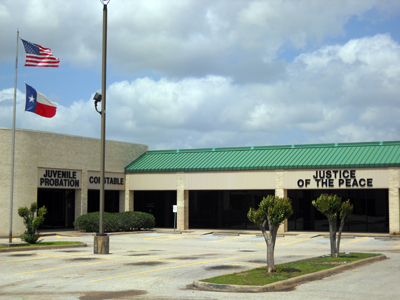In this court and others in Bexar County, debt collection lawsuits more than doubled from 2012 to 2020.
“I’m trying to manage this behemoth, but there are some guidelines I have to follow as well,” said Roger “Rogelio” Lopez Jr., justice of the peace for Bexar County Precinct 4, who operates out of the Loop 410 courthouse.
Similar scenes are playing out from Houston to Dallas to Fort Worth as debt collectors sue a skyrocketing number of Texans over claims of unpaid credit cards, medical bills, student loans and other debts, a Houston Chronicle examination has found.
Debt collection lawsuits filed statewide have exploded by 73 percent from 2012 to 2021, according to a Chronicle analysis of data from the Texas Office of the Court Administration.
For the first time in history, the 374,000 debt lawsuits filed in the Lone Star State last year made up nearly half of all civil cases in Texas, which include traffic tickets, landlord evictions and small claims such as disputes between neighbors. The crush of debt cases raises concerns that overwhelmed Texas civil courts can’t adequately review each lawsuit and deliver justice while juggling higher-priority cases, consumer advocates say.
That means judges face pressure to move debt lawsuits quickly to keep their dockets manageable. With only minutes to review cases, judges can miss important details, consumer advocates say. The rapid-fire justice puts a sharp focus on whether defendants can get a fair shake, said Mary Spector, professor of law at Southern Methodist University in Dallas.
“Any public perception that the courts are merely rubber-stamping for the creditors is bad for the system,’’ said Spector, who directs a law clinic that works on behalf of consumers in debt litigation.
Texas adopted key provisions that have spurred debt collectors to crank out more cases in recent years.
From 2012 to 2020, state lawmakers passed legislation that gave debt collectors more flexibility to file cases in justice of the peace courts, where filing costs are lower and it takes less time to move cases on the docket. The changes, which included actions by the Supreme Court of Texas to revamp the debt collection process in civil courts, ultimately made it cheaper and faster for debt collectors to win judgments, consumer advocates said.
The Supreme Court of Texas, which is responsible for adopting processes and rules to ensure that state courts are efficient and fair, has been alarmed by the rise in caseloads, Chief Justice Nathan L. Hecht told the Chronicle.
“You need to worry about it,” Hecht said. “This is where the public meets the justice system.”
To address those concerns, the Legislature ordered the state Supreme Court to publish new rules that will require debt collectors to provide additional notification to debtors of their rights, he said. The rules take effect May 1.
Big corporations have high-powered attorneys to manage their interests. When they have a problem, they can ask for help from the Supreme Court. Hecht said they also can lobby the Legislature to prompt changes in state law.
“But this is about the little guy,” he said. “What the justice system has to do is to provide justice for the people who come to it. We want everybody walking away from the court saying, ‘Well, thank God for the court. I may have lost, you know, I wish that had not happened, but I got a fair shake.’ That’s why it’s so important to work on these cases.”
A Chronicle review of dozens of court documents, observations of legal proceedings and an examination of statewide data found that:
- Last year, 45 percent of lawsuits filed in the state’s civil courts were against Texans for debt, according to data supplied to the Chronicle by the Texas Office of the Court Administration, the state agency that collects the data and operates under the direction of the Supreme Court. In 2017, debt lawsuits represented 30 percent of all civil filings.
- Harris County saw a similar trend. Last year, debt collectors filed nearly 68,000 lawsuits in the county, an increase of 111 percent from 2015.
- Cases settled by default judgment have increased since 2012. That means more cases are decided with defendants not present to fight a claim, and the court cannot weigh both sides equally before making a judgment. The number of default judgments in the Houston region and other large Texas counties totaled nearly 74,000 cases in 2021, an increase of 86 percent from 2012.
- No court in the state has seen a more dramatic increase in debt suits than justice of peace courts. JPs, as they are known, preside over weddings, misdemeanors and truancies. Many JPs are not lawyers. Of the hundreds of thousands of debt collection lawsuits filed in Texas in 2021, 80 percent were in JP courts.
There’s a lot more, so read the rest. Hopefully, the new rules will help, but this seem like a much deeper issue than that. Obviously, a lot of this is societal – poverty, access to attorneys, the ability to take time off from work to attend court hearings, and so on – and there’s not much the courts can do about that. But they can do their part to make sure the playing field inside the courthouse is level, and they need to do that. And the Lege needs to revisit this as well.

